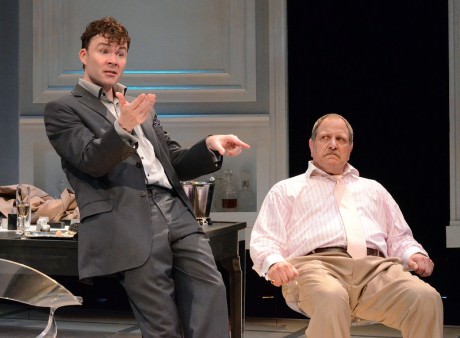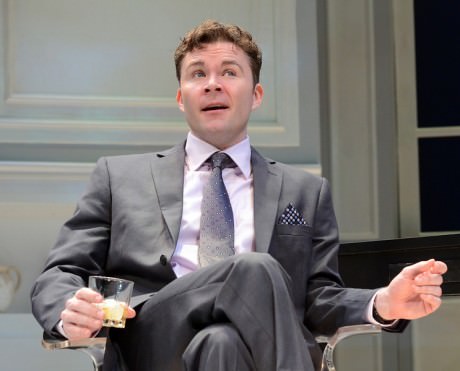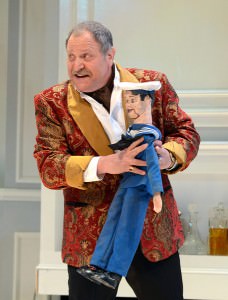Bob Ari and Jeffries Thaiss are having a blast performing in Sleuth. They fill us in about their roles and working with Artistic Director Jim Petosa in his final production at Olney Theatre Company.
How did you get involved in this production of Sleuth? Why did you want to put yourselves in the position to remember hundreds-or is it thousands-of lines every performance? Do you actually know how many lines you both have? And have you played these roles before?
Bob: First off, let me say that I was not supposed to be in this production. Jim Petosa, our director, had actually cast another actor in the role of Andrew Wyke However, that actor bowed out a couple of months before rehearsals were to begin. Based on his experience working with me on Witness For The Prosecution last season, Jefferies Thaiss recommended me to Jim. Jim had never actually seen Witness… as he was deeply involved with his duties as head of the theatre department at Boston University, so on Jefferies’ say so he hired me sight unseen. We had never met before our first rehearsal. Happily, things went beautifully and our working relationship has been very amicable.
I had actually understudied the role at A.C.T. in San Francisco when I was a young actor starting out. It was directed by one of the greatest American theatre directors ever, Ellis Raab and I was 21 years old. Thankfully I never had to go on but I promised myself that one day, when I was more age appropriate, I would do Wyke. So this whole thing is very fortuitous. But that how things are so often in the theatre.
I’ve never actually sat down and counted how many lines I have. That would be a fool’s errand. And besides, it’s never a consideration in whether or not I decide to take on a role. Would it be fun to do? Would it makes me grow as an artist? Do I have something to offer the role? These are the only questions I have before saying “yes” to a job. And this role is the most fun I’ve had in the theatre in a long time.

Jeffries: I got involved in this production because Jim Petosa and I did a production of Sleuth in NH (New London Barn Playhouse) in 2010. Jim then decided to do it down here at Olney, and happily wanted to keep me as Milo. The number of lines, though tough to get under the belt, are a joy to memorize, given the excellence of the writing.
Introduce us to your characters and tell me why you wanted to play them. What do you respect and not admire about these characters?
Bob: I so love Wyke’s wit, his style, his ingenuity and his mischieviousness. It’s all in his description of himself in Act II, “a man of reason and imagination, of potent passions and bright fancies. He’s joyous, he’s unrepentant.” He is also a world reknowned mystery writer and I’ve always envied creative artists who are solitary and can work when the inspiration moves them, like writers, composers, painters and, yes, playwrights. An actor is a performing artist and, as such, is always part of a collaborative process which means being ready to work at subscribed times.
Jeffries: Milo is a young man who came from humble London beginnings and is trying to make a better life for himself, but, it’s a struggle. I think a lot of people in the theatre can relate to that. I admire Milo’s intelligence, and the largeness of his heart. The parts of him I don’t admire would give away too many of the play’s surprises!
You are being directed by Artistic Director Jim Petosa who is leaving the theatre after this season. How would you describe his style of directing? And what was the best advice he gave you about preparing for these roles?
Bob: As far as working with Jim Petosa, I would describe his style as very hands off. He really wants everything to come from the actor. He will pull you off the ledge if you’re in fear of falling but otherwise he is more an editor than a source of the performance. He did make one statement early on in the rehearsal process that stayed with me – and that was not to be fooled by the play’s facility, that there are deeper wells of motivation in each of the characters and to keep digging and that has uncovered much more richness in all of us and served the play admirably.
Jeffries: Jim is a great director, artist, and I am happy to call him my close friend. He has endless imagination and is eager to collaborate. There is no question, no idea, that he is not willing to explore. He also believes in building the confidence of all those he works with. His rehearsal rooms are places where it’s safe to attempt, and to fail. I think that is very important in building fine productions.
What other fond memories of working with Jim now and in the past can you share with us?
Jeffries: There are too, too many cherished memories I have of Jim to come up with one. For those who haven’t met him, but have seen his productions, the humanity that his actors bring to the stage will tell you a lot about this wonderful man.
Anthony Shaffer has written this beautiful script that is so poetic and biting. How would you describe his script, and what do you admire about it?
Bob: Sleuth does, indeed, have a marvelous script. And so unexpected. The story goes that Anthony was complaining to his brother, the great playwright, Peter Shaffer, that everything he was seeing in the theatre was so predictable. So Peter challenged his brother to write something not so. It’s the only play he ever wrote, at least that I’ve heard of. It’s like an acid etching on old parchment. It’s a classic mystery thriller only it’s as if Joe Orton wrote it.
Jeffries: The reason this play exists is because Shaffer was complaining that all the thrillers he saw were predictable, and he was told he should write one himself that wasn’t so. That’s what I admire most about it. Legitimate surprises.

What are some of your favorite lines and speeches in the play?
Bob: I have many favorite lines. I would have to say that I’m very fond of “Sex is the game with marriage the penalty” but my real favorite is “You mendacious bollock of Satan.”
Jeffries: Again, I feel if I talk about my favorite lines in the play, it’ll give away the surprises!
Bob, you are on the stage for the entire play. What are you doing special to build up the energy to pull this off?
Bob: You are right. My energy is challenged every night. Although when I get to the end of each performance, I’m so wound up it takes me almost four hours to get to sleep. Sleep is very important: I’m sleeping eight hours every night probably for the first time in my life. I’m also taking my running regime very seriously and eating very lightly before each performance.
Cristina Todesco’s set plays an important role in the show. What do you like most about performing on that set?
Jeffries: The set is beautiful, the floor evocative of a chess board. That’s what I most enjoy about it.
Jeffries: You have performed so many times at Olney Theater Center, that the theatre is becoming synonymous with your name. Why do you enjoy performing at Olney? What other roles have been your favorites here at Olney?
Jeffries: My favorite production ever, anywhere, was Jim’s production of Michael Frayn’s Democracy. A very difficult play that took us all, artists and audience, by both the mind and the heart. A theatre is people, and it’s the people I have met here over the years that have made me love Olney.
Bob, you have performed on and off Broadway, regionally and in television and film. Why do you keep coming back to the theatre, and what is it that the theatre offers that these other mediums do not?
Bob: Theatre is the actor’s medium. Film is the director’s. A director (and an editor) can create the pace of a movie, they can make an actor look better than they really are (reference Lady Sings The Blues) and a movie director tells you what to look at simply by where he points the camera. In the theatre the pace is created by the actors, you are responsible for telling a clear and interesting story, you build the arc of a performance and then you must sustain it for two hours, night after night. And finally, you are always being watched by the audience even when the focus is not necessarily on you, so the energy and concentration must always be there. But, in the final analysis, it’s the immediate feedback that you get from an audience that is the most gratifying to me and what keeps me coming back to work in the theatre.
Why do you both think Sleuth is still so popular and still ‘fooling’ audiences?
Bob: Sleuth is a marvelous piece of entertainment. It’s edgy, it’s funny, it features some very charismatic characters and it moves along quite briskly. But I think what makes it effective as a mystery is that it turns on a dime and the surprises sometimes come in the space of a line. Also, I think audiences come in to a thriller/mystery wanting to be thrilled and mystified and so, really, we’ve got them from the get-go.
Jeffries: It’s a play who’s character are compelling individuals. Even for those who have seen this play, and know the surprises, it’s worth seeing again and again because the people are so interesting.
What have been some of the audience reactions that you have enjoyed and/or have surprised you?
Jeffries: I love it when I hear the audiences vocally reacting to the surprises in the play, or who come up to me after and express their joy at being taken for such a ride!
What are you both doing after Sleuth?

Bob: I will undoubtedly do more theatre in the coming year and hopefully some of it will be at the Olney Theatre. The new Artistic Director, Martin Platt, is an old schoolmate of mine from Carnegie-Mellon. We were in the same class and as freshmen decided that since the school was not going to allow us to perform in their shows, we would do our own. So working for about six months, only on Sundays which was the only free time we had, we put up a production of A Funny Thing Happened On The Way To The Forum in the school’s ballroom. Martin directed and I played Pseudolus. Martin is one of the most talented and smartest directors working today and he will undoubtedly bring a new energy and character to the Olney Theatre Center. I only hope I get to be a part of this exciting change.
Jeffries: I’m going to New Hampshire to do The Mousetrap at New London Barn Playhouse.
Sleuth plays through through July 8, 2012 at Olney Theatre Center – 2001 Olney-Sandy Spring Road, in Olney, MD. For tickets, call the box office at (301) 924-3400, or purchase them online.
LINK:
Katie Elizabeth Quinn’s review.




